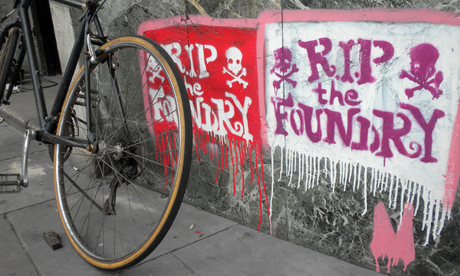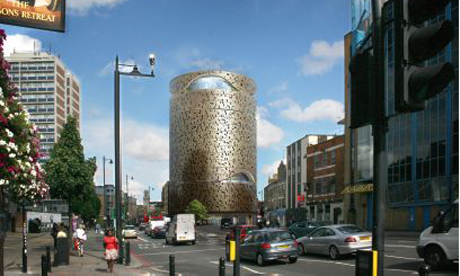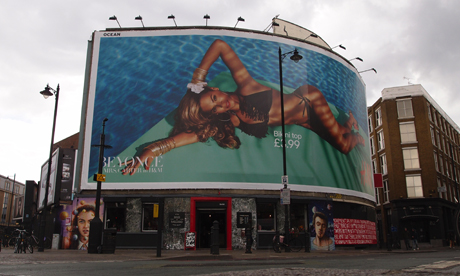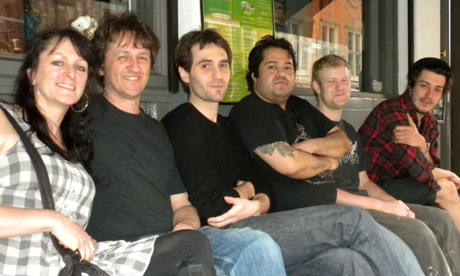Billionaire brothers’ plans for hotel on Foundry site stalled

Photo: © Josh Loeb
Three years after alternative arts venue and bar the Foundry was forced out of its Shoreditch premises to make way for a designer hotel, not a brick has yet been laid by developers working on the scheme.
The 18-story hotel, called an “art’otel”, was controversially granted planning permission by Hackney Council in 2010 amid promises of jobs, investment and a glitzy new skyline when it opened.
The 352-room hotel designed by architects Squire and Partners was scheduled to open this year at the junction of Great Eastern Street and Old Street, but instead the grey building that once housed the Foundry remains on the site and is now covered in billboards.
Park Plaza Hotels, which is behind the development in conjunction with billionaire property magnates the Reuben brothers, has so far been tight-lipped over the delay, saying only that plans were “in development.”
But a spokesman for the Reuben brothers today confirmed new plans for a scaled down 150-room hotel along with 100 apartments as well as restaurants, art galleries and leisure facilities would be submitted to Hackney Council’s planning committee later this year.
Explaining the delay, he added: “This is a highly complex building on a prominent site and it has taken a long time to come up with the right solution, one that works for the hotel operator, the developer, the council and the community.
“It was decided that a trendy 350 guestroom art’otel was too big for this location and that considerable synergies would result from combining a smaller hotel with cutting edge apartments.
“We are convinced that the new scheme will be exciting and well received. A public exhibition and consultation will be organized in the near future for the benefit of neighbours.”
No start or completion date has been given, but the earliest the developers could expect to complete the scheme is by 2017 assuming permission was granted – more than three years behind schedule.

An artists' impression that accompanied the original plans for the art'otel, which was due to open in 2013
The original planning application for the hotel was the subject of a well-publicised and passionate campaign by artists, patrons and residents opposed to the loss of the Foundry.
Cyclists from the London Courier Emergency Fund, a charity that raises cash for injured bike couriers and used the Foundry as its base, also joined the fight.
The Foundry was renowned for its alternative arts programme and open-door policy for artists looking to exhibit and perform and was described as an incubator of creative talent.
English Heritage and CABE (Commission of Architects and the Built Environment), a quango that advised the government on building design, also opposed the design, height and location of the hotel.
The site falls within a conservation area and local planning guidelines stipulate buildings should be in keeping with the area and not more than six-storeys tall.
Alastair Brotchie, a local resident of 15 years’ standing and an outspoken critic of the hotel and its design, criticised the council and developers who had given such importance to the site.
He said: “This was going to be the gateway to Shoreditch and in the meantime they have just covered it in billboards. It’s a conservation area and they’re not supposed to be allowed. It looks awful.”

The Foundry's former home as it looks today. Photograph: Glenn McMahon.
Mr Brotchie described the original hotel plans as “totally out of scale” and an “aluminium monstrosity”.
It is not clear if the proposed building’s exterior aluminium design will remain the same or be modified.
Hackney Council has said the 18-storey hotel should be seen in context with the buildings outside of the conservation area.
Despite campaigners’ best efforts to save the Foundry there was little that could be done to prevent its eviction.
Hackney Council’s Arts, Cultural and Entertainment (ACE) policy states that the council “resists the loss of an arts, cultural or entertainment facility unless it is satisfied that an adequate replacement can be made”.
But the Foundry’s owners, Jonathan and Tracy Moberly, were told by the council it did not qualify for ACE protection as it was only a bar and not an arts venue – despite putting on 2,000 exhibitions and performances during its 12-year existence and its planning permission specifying “restaurant with gallery and theatre group activities”.

Tracey and Jonathan Moberly with Foundry staff on the venue's last day of operation in 2010. Photo: © Josh Loeb
The council also blamed the Moberlys for failing to apply for ACE status.
Town Hall officials contradicted this when, in response to a Freedom of Information request, they said there was no ACE status to apply for, rather such status was determined by a business’s creative output.
Jonathan suspected the real reason Hackney Council failed to help was that the venue and its clientele were not in keeping with its vision for the area.
“The closure of the Foundry was a completely pointless exercise,” he said, adding that he believes the existence of a community-run cultural hub was considered by planners and developers to be “a threat”.
He said despite their best efforts to find a new venue, their efforts have been frustrated, exhausting their enthusiasm to open a new venue and leaving the Foundry’s displaced community still without a home.
A spokesman for the Reuben brothers said a public exhibition and consultation will be organized in the near future for the benefit of neighbours
